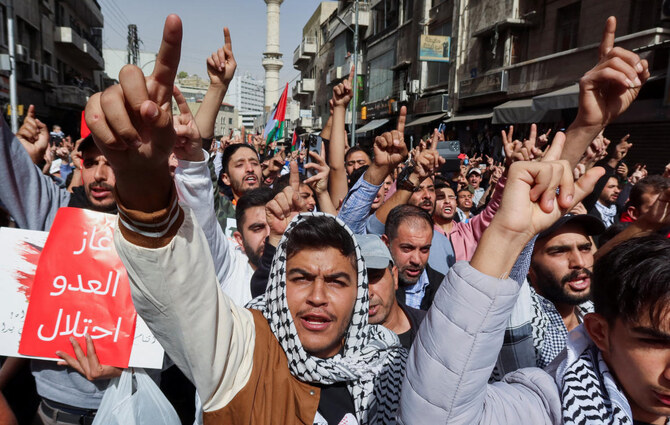AMMAN: A cross-border attack in October by two young Jordanians against Israeli soldiers is a sign of deep anger at the war in Gaza in a country with strong ties to the Palestinians.
“Jordanians are boiling with anger, this is undeniable,” said Oraib Rantawi, head of the Amman-based Al Quds Center for Political Studies.
The attackers, who were killed in a firefight south of the Dead Sea last week that lightly wounded two Israeli soldiers, were members of the Muslim Brotherhood in Jordan, although the Islamist group said they acted independently.
It came just weeks after another attack by a Jordanian gunman at a border crossing with the occupied West Bank which killed three Israeli guards.
The two assailants in the most recent attack, Hussam Abu Ghazaleh and Amer Qawoos, had “always participated in events in solidarity with Gaza and in support of the resistance,” a Muslim Brotherhood spokesman recently said.
While there have been protests, Rantawi said, many Jordanians want concrete action against Israel, such as suspending trade or cutting diplomatic ties.
“Some young people, particularly those from Islamist, nationalist and leftist movements, feel that protests alone are not enough,” he said.
Jordan, where about half of the population is of Palestinian origin, has yet to officially condemn the attack.
But, Prime Minister Jafar Hassan said after the latest attack: “We will not be a place for strife or accept the risking of the future of this country, and we will not allow any party to replicate their models of chaos and destruction in our homeland.”
In 1994 Jordan became the second Arab country, after Egypt, to recognize Israel and establish diplomatic ties. Their shared border has remained largely calm since then.
Palestinian militant group Hamas, which has been fighting Israeli forces in Gaza since its October 7 attack last year sparked the war in the territory, called the latest attack “a significant development in the ongoing battle.”
It came just hours after Israel confirmed its forces in Gaza had killed Hamas leader Yahya Sinwar, accused by Israel of masterminding the October 7 attack.
That attack resulted in the deaths of 1,206 people in Israel, mostly civilians, according to an AFP tally of official Israeli figures.
Israel’s retaliatory campaign in Gaza has killed 42,924 people, the majority civilians, according to data from the health ministry in the Hamas-run territory, figures which the United Nations considers reliable.
The cross-border attacks “highlight mounting pressure on ordinary Jordanians as a result of Israel’s escalating aggression with the United States’ continuous support,” said political analyst Labib Kamhawi.
He said “the anger is evident both at the public and official levels, with the Jordanian government frustrated by Israel’s aggressive behavior.”
Amman has been “signalling that Jordan cannot ignore rising public outrage,” he added.
Many Jordanians saw the perpetrators of both attacks against Israel as martyred heroes, some even celebrating with sweets and fireworks in Amman.
Maher Diab Hussein Al-Jazi, who carried out the September attack before killing himself, was also hailed as a hero.
His father told local media that he was “honored to have raised a brave son who carried out an act of sacrifice.”
Faced with widespread anger from its people, Jordan has been striving to bring a diplomatic end to the war in Gaza.
But, Kamhawi said, “some Jordanians now see that attacks remain the only way of expressing solidarity with Palestinians.”
Jordanians ‘boiling with anger’ at Gaza spurring Israel border attacks
https://arab.news/vxk9d
Jordanians ‘boiling with anger’ at Gaza spurring Israel border attacks

- In 1994 Jordan became the second Arab country, after Egypt, to recognize Israel and establish diplomatic ties
- Many Jordanians saw the perpetrators of both attacks against Israel as martyred heroes





























